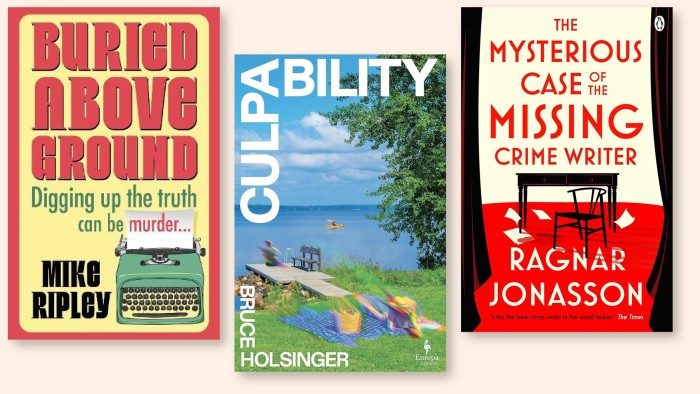Unlock the Editor’s Digest for free
Roula Khalaf, Editor of the FT, selects her favourite stories in this weekly newsletter.
There are spirited talking points connected with the parallel lives of JK Rowling. Under her real name, she is the creator of the all-conquering Harry Potter franchise, but she has latterly enjoyed acclaim for her crime fiction written as Robert Galbraith. As Rowling, the writer has become a high-profile gender-critical voice in the trans debate but, as Galbraith, the points of dissension are more literary: however popular her novels featuring the detective Cormoran Strike may be, do they have to involve such high page counts?
In her latest, The Hallmarked Man (Little, Brown £30/Mulholland Books $40), every one of the 897 pages is justified — this may be Galbraith/Rowling’s most forceful outing yet. When the dismembered body of a man police believe to be an armed criminal is found in the vault of a London silver merchant, Strike is hired by Decima Mullins to find out whether the body is that of the missing father of her newborn baby.
The shop in question is beside Freemasons’ Hall — its speciality is Masonic items — and various possibilities as to the identity of the body present themselves. A complex narrative (with superscriptions quoting AE Housman and Robert Browning) is further complicated by Strike’s conflicted desire to declare his love for his agency partner, Robin. The personal and professional are expertly juggled in a novel that largely maintains the irresistible trajectory of this series, intimidating page count notwithstanding.

The Icelandic crime writer Ragnar Jónasson had a canny strategy for breaking into the non-Scandinavian market: before a word of his had been translated into English, he made frequent trips to the UK to become a familiar face on its crime-writing scene. Over the past decade the translated works have shown him to be a considerable talent, with novels such as Snowblind. The jokey title of his latest, The Mysterious Case of the Missing Crime Writer (Michael Joseph £20/Minotaur Books $29 translated by Victoria Cribb), wrongfoots the reader: despite a plethora of classic crime fiction tropes, the central mystery is not at all cosy — it’s as dark and threatening as anything in Nordic noir.
In Reykjavik, best-selling crime writer Elín S Jónsdóttir has disappeared. Tracking her down, youthful detective Helgi discovers that the missing author’s story is a classic case of Winston Churchill’s “riddle, wrapped in a mystery, inside an enigma” — Jónsdóttir’s past turns out to be strange indeed.
The Isles of Scilly, lashed by winter storms, are the setting for Deadman’s Pool by Kate Rhodes (Orenda £9.99). Detective Inspector Ben Kitto braves inclement weather to transport a priest who plans to live in a ruined church on the archipelago. Digging in the sand, Kitto’s dog discovers the decayed corpse of the young woman who, it transpires, had no connection to the residents of the island. As the weather grows ever more turbulent, Kitto has to track down a murderer living among the unsuspecting islanders. No one produces more elegantly written work than Rhodes (who is also a poet), and this eighth instalment in her Isles of Scilly Mysteries series has the same acute sense of place as any of its predecessors, with Kitto as richly characterised a protagonist as ever.

A British writer working at the coalface of crime fiction for decades is Mike Ripley, most recently breathing new life into Margery Allingham’s sleuth Albert Campion in the detective’s sunset years. Buried Above Ground (Severn House £21.99) is a piquantly metafictional departure, announced in the author’s note as a “novel about writing crime novels”. The target of satire here is British classic crime (on which the talented Mr Ripley is an expert) with a quest to obtain the rights to a forgotten author’s backlist proving to have deadly consequences. Five unreliable narrators and Ripley’s trademark wit ensure the reader will not look at classic crime in quite the same way again.
Novelists who earn their crust solely by writing tend to resent interlopers from other professions, and the actor Richard Armitage might have expected some unfriendly badinage when he took up the crime fiction cudgels. But his debut Geneva gleaned praise, and The Cut (Faber £18.99/Pegasus Crime $27.95) bids fair to replicate that success. The village of Barton Mallett is destabilised when a murder from decades ago is linked to a film being made in the present — with menacing results. A dual timeline is nicely orchestrated by Armitage, though some may feel his scene-setting is a tad leisurely.

The human race wakes every morning with a new worry, and among such anxieties at present is artificial intelligence. Bruce Holsinger’s Culpability (Europa £14.99/Spiegel & Grau $30) functions efficiently on a variety of levels as family drama, thriller and a sober examination of what current technological developments have in store for us.
Finally, intriguing work from east Asia. The 20th-century Japanese writer Seishi Yokomizo has been likened to Agatha Christie, and Murder at the Black Cat Café (Pushkin Vertigo £10.99) contains two impeccably plotted novellas, both originally published in 1973 but newly translated by Bryan Karetnyk. The duo form an entertaining, if undemanding, divertissement.
Barry Forshaw is the author of ‘Brit Noir’
Join our online book group on Facebook at FT Books Café and follow FT Weekend on Instagram, Bluesky and X

